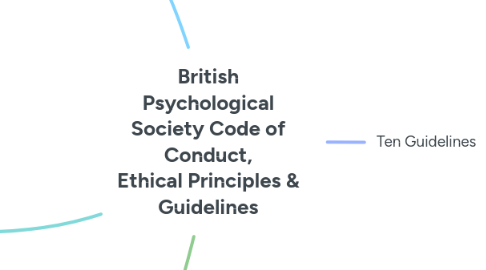
1. ‘The British Psychological Society recognises its obligation to set and uphold the highest standards of professionalism and to promote ethical behaviour, attitudes and judgements…’
2. Four ethical principals
2.1. Respect
2.2. Responsibility
2.3. Integrity
2.4. Competence
3. Summary
3.1. Ethics must be considered when designing research, when briefing, debriefing participants and analysing results.
3.2. You should avoid:
3.2.1. Causing stress, distress or embarrassment
3.2.2. Potential harm to yourself or your participants
3.2.3. Deception that might lead to the above
3.3. Gain informed consent
3.3.1. Debrief your participants
3.3.2. Observe only public behaviour where participants would expect to be seen or watched (not required for your IA)
4. Ten Guidelines
4.1. 1) General
4.1.1. Researchers must embody integrity, impartiality and respect for everyone involved, and should aim for the highest ethical standards in their work.
4.1.2. For every experiment you must consider the ethical consequences for all participants.
4.2. 2) Consent
4.2.1. Researchers must obtain informed consent, after telling the participants the aims of the experiment.
4.3. 3) Deception
4.3.1. You should never withhold information, or mislead/ misinform participants. However if absolutely necessary for the investigation, you can.
4.4. 4) Debriefing
4.4.1. When you have concluded taking data, you should discuss and debrief with participants, ensuring no negative effects.
4.5. 5) Withdrawal from the investigation.
4.5.1. Make sure that participants know they can withdraw from the experiment at any time, and their data destroyed.
4.6. 6) Confidentiality
4.6.1. Due to the Data Protection Act, information about participants are confidential, and must be published anonymously.
4.7. 7) Protection of Participants
4.7.1. You have a responsibility to protect participants from mental and physical harm they could incur during the investigation, and you should know about pre existing medical conditions
4.8. 8)Observational Research
4.8.1. You must respect participants privacy and psychological well being, and people must give consent to be observed unless in a public setting.
4.9. 9) Giving advice
4.9.1. If you obtain evidence of physical or psychological problems during an experiment, you should relevant source professional advice for them.
4.10. 10) Colleagues
4.10.1. All investigators share responsibility for the ethical treatment of participators, and if you suspect any unethical conduct you should raise it immediately.
